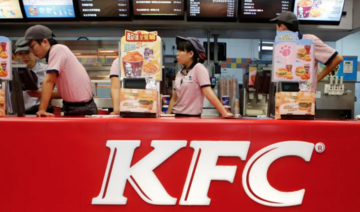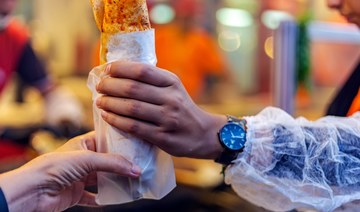GANGNEUNG, South Korea: Forget Lindsey Vonn and Adam Rippon. The real rock stars of the Pyeongchang Olympics are a humble group of Korean curlers who have no idea they’ve become a global sensation.
They are known as the “Garlic Girls,” the South Korean women’s curling team with the fairy-tale story whose moniker reflects the locally-famed garlic grown in their hometown. Never considered a medal contender coming into Pyeongchang, they have risen to No. 1 in the rankings, earning worldwide attention for their fierce talent and funny personalities.
And yet the Garlic Girls have been almost totally sheltered from the international frenzy both by personal choice — they switched off their phones during the games to block outside attention — and by a protective coach who is keenly aware that curling is as much a mental game as a physical one.
After a recent match, the women were quickly shuffled past waiting reporters, giving journalists apologetic smiles and greetings of “Anyonghaseyo!” (hello) before vanishing. None of them, says coach Kim Min-jung, are aware that they’ve become superstars.
“I’m sorry that I could not bring the athletes today, because I’m worried there will be too much pressure and burden on them,” Kim said. “Even the crowd is too interested in them.”
That interest is understandable. The Garlic Girls seem tailor-made for stardom.
The wildly skilled underdogs came into the Olympics ranked eighth in the world and went on to crush curling heavyweights including Canada and Sweden. They are cute and comical, referring to themselves by quirky nicknames such as “Pancake” and “Steak.”
Two teammates are sisters and all are longtime friends, creating irresistible chemistry on the ice. The team’s “skip,” or captain, has a steely gaze and funky, owl-eyed glasses that have become fodder for endless Internet memes.
Many Koreans who have never seen a curling match have nonetheless traveled to remote Gangneung to peek at their nation’s new darlings in person.
“I’m very proud of them,” said Lee Ji Sun, a 26-year-old who had never been inside a curling arena before Wednesday’s match. “They are showing we can do well even in new sport events.”
Every match featuring the team is packed with screaming, flag-fluttering Koreans who leap to their feet to cheer on the women’s stunningly precise shots. One fan in the crowd Wednesday waved what appeared to be a hand-drawn portrait of skip Kim Eun-jung with her trademark spectacles.
The excitement surrounding the women even prompted a few dozen senior citizens from the southern city of Jaecheon to charter a bus to the arena so they could revel in the country’s newfound curling prestige.
“I actually don’t know curling rules, so I have to find out what’s going on from people sitting next to me,” said Yang Chang-nam, 77. “I feel very good as the South Korean team is doing well.”
That curling has gained any prominence in Korea is surprising in itself. Korea didn’t even have a team in Olympic curling until the 2014 Sochi Games.
It took Koreans awhile to wake up to curling, largely because the country lacked sufficient facilities until recent years, Kim Young, a curling legend who started the Korean Curling Club in 1988, said by email. Now, he says, Korea has six dedicated curling arenas, and many schools have curling teams.
In 2006, South Korea’s first curling center was built in the rural town of Uiseong. Four of the five team members attended Uiseong Women’s High School, where they were on the school’s curling team. Uiseong’s reputation as the nation’s default curling capital slowly grew, and the curling center has hosted about 15 major domestic and international curling events.
Still, until the women’s team began their surprise winning streak in Pyeongchang, Uiseong was better known for its prolific garlic production.
Koreans consider garlic a health food that boosts stamina. Seo Eun Ha, a 26-year-old Garlic Girls fan, believes garlic may have contributed to the team’s success. (She also credits the women’s good teamwork and strong relationships.)
Like many fans at Gangneung, Seo is particularly fond of the curlers’ unusual nicknames: Sunny, Steak, Pancake, Annie (a brand of yogurt) and ChoCho (a type of cookie).
“I think their nicknames go well with their lively images,” Seo said. “I like ‘Steak’ the most. It sounds so funny and unique.”
The nicknames started as a gag over breakfast one day, said Kim, the coach. The women were talking about how difficult it was for other countries’ athletes to pronounce their names at international competitions. All five team members and their coach also share the same surname — Kim, which is very common in Korea — making their names even more confounding for foreigners.
Kim Seon-yeong, who was eating a sunny-side-up fried egg, joked that she could go by the name “Sunny.” The other women loved the idea. They each opted to nickname themselves after the English words for their favorite breakfast foods, figuring that would be easier for others to grasp.
Though the women’s team is getting the most attention, Korean fans have been going wild for the men, too. After Wednesday’s men’s match, a player from the Korean team began throwing T-shirts into the crowd, which surged forward with outstretched arms.
Kim Heae Darm, a fan who leaped up and managed to snag a shirt sailing overhead, pressed it to her face and screamed with glee. She then turned to capturing the attention of Korean mixed doubles player Lee Ki-jeong, who scrawled his autograph in her notebook.
As she struggled to catch her breath, she explained her excitement by noting that Lee was strong, athletic and “very handsome.”
“I like them so much!” she squealed.
Kim believes the exposure the sport has received in Pyeongchang will lead to an influx of new curlers in the country, particularly because parents will support children taking it up.
As for the success of the women’s team, Kim, the founder of the curling club, couldn’t be prouder. “They are heroes!” he said.
Yet the Garlic Girls do have one request: Maybe someone could come up with a nicer team name for them?
“We would prefer the name ‘Team Kim,’” Kim, the coach, said with a laugh. “Because although our hometown is Uiseong — which is related to garlic — we have no relationship with garlic at all.”
Garlic Girls: South Korean curlers the rock stars of Winter Olympics
Garlic Girls: South Korean curlers the rock stars of Winter Olympics
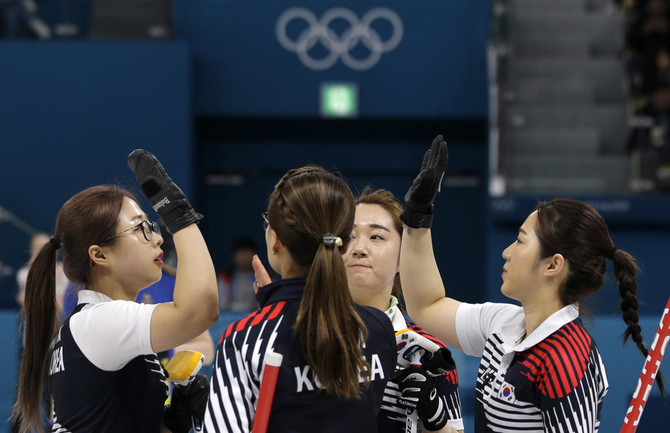
French barber still trimming at 90
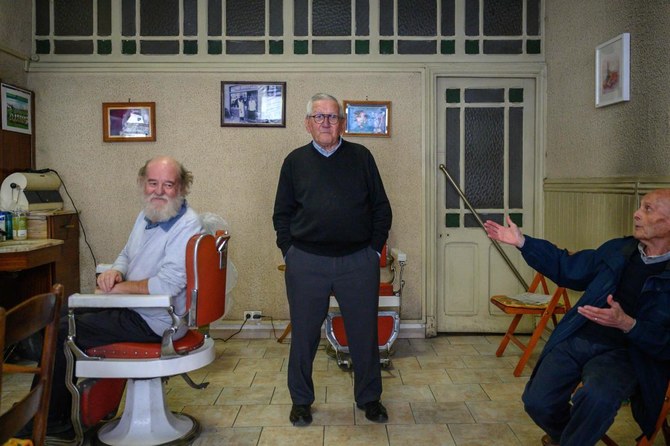
- “I love this job, it’s in my bones,” he said
- Even with arthritis, he is on his feet from Tuesday to Saturday, tending to his customers’ hair and beards in his shop in the small southern town of Saint-Girons
SAINT-GIRONS, France: French barber Roger Amilhastre, 90, could have hung up his clippers decades ago but he said his passion for hair gives him a reason to get up in the morning.
“I love this job, it’s in my bones,” he said, leaning on one of his cast-iron barber’s chairs from the 1940s.
“And despite my age, my hands still don’t shake.”
Even with arthritis, he is on his feet from Tuesday to Saturday, tending to his customers’ hair and beards in his shop in the small southern town of Saint-Girons in the foothills of the Pyrenees.
“I would have liked to retire at 60, but my wife was sick and I needed to pay for the care home,” he said, which cost more than 2,000 euros ($2,150) a month.
Even after his wife died in January, he kept going to work to stave off the sad thoughts.
“I’m not grumpy getting up” to go to work, he said.
France’s national hairdressers’ union believes Amilhastre may be France’s oldest active barber.
“We have a few who continue late in life, but 90 years old is exceptional,” union president Christophe Dore told AFP.
“I’m not sure if he is France’s oldest barber, but if not, he can’t be far off,” he added.
According to the national statistics institute INSEE, a little more than half a million people over 65 still work in France.
In the southern region of Occitanie, where Amilhastre lives, only 1.65 percent of people older than 70 years old still work, including 190 79-year-olds. But statistics do not go beyond that age.
Many of Amilhastre’s customers call him Achille, after his father who founded the barber’s shop in 1932, giving it his name and then teaching his son the profession.
The shop witnessed the German occupation of France during World War II.
“During the war, German police came to find my father to groom a captain who had broken his leg,” Amilhastre said.
German troops had taken over a large stately home in town called Beauregard.
“We were scared because they used to say that anyone who went up to Beauregard never came back,” he said.
“Luckily he did.”
The 90-year-old said he remembered a “tough period” for businesses when he first picked up the scissors in 1947 a few years after the war ended.
But then the town rebounded, he said, with its men following a flurry of new hair trends from greased back quiffs in the 1950s to 1970s bowl cuts.
The barber’s shop survived an economic downturn as local paper mills closed in the 1980s sparking mass layoffs, and supermarkets pushed small shops out of business.
“People started looking for work further afield, so we had to adapt and stay open later in the evening,” Amilhastre said.
That same decade, the AIDS epidemic sent customers into a worried frenzy.
“People were scared. They no longer asked to be shaved and when we did, we were petrified there’d be a cut, that someone would bleed and the virus would be passed on to the next customer,” he said.
Jean-Louis Surre, 67, runs the nearby cafe where Amilhastre once taught him to play billiards as a young boy.
Behind his bar, Surre said he still remembered his mother taking him across the road to see Amilhastre for a haircut every month as a child.
“He’d pump up the chair to reach the mirror, use his clippers and then at the end perfume you with some cologne — you know, squeezing those little pumps,” he said.
He is one of several old-timers to regularly drop by Achille’s — even just to read the newspaper or have a chat.
Inside the barber’s, Jean Laffitte, a balding 84-year-old, said he no longer really needed a haircut.
“With what little is left up there, these days I come out of friendship,” he said.
China’s Shenzhou-18 mission docks with space station

- The astronauts took off from the Jiuquan Satellite Launch Center in China’s northwest at 8:59 p.m. local time Thursday
- The astronauts will stay at the Tiangong space station for six months, carrying out experiments
JIUQUAN, China: A spaceship carrying three astronauts from China’s Shenzhou-18 mission safely docked at Tiangong space station Friday, state-run media reported, the latest step in Beijing’s space program that aims to send astronauts to the Moon by 2030.
The crew took off in a capsule atop a Long March-2F rocket from the Jiuquan Satellite Launch Center in China’s northwest at 8:59 p.m. local time 1259 GMT) Thursday.
By early Friday the spacecraft had “successfully docked” with the space station, state-run news agency Xinhua reported, citing the China Manned Space Agency.
The mission is led by Ye Guangfu, a fighter pilot and astronaut who was previously part of the Shenzhou-13 crew in 2021.
He is joined by astronauts Li Cong and Li Guangsu, who are heading into space for the first time.

Onlookers cheered as the rocket blasted off into the night sky, an AFP journalist at the scene said.
Xinhua said the launch had been declared a “complete success.”
The astronauts will stay at the Tiangong space station for six months.
There they plan to carry out experiments “in the fields of basic physics in microgravity, space material science, space life science, space medicine and space technology,” the China Manned Space Agency has said.
They will also try and create an aquarium onboard and seek to raise fish in zero gravity, according to Xinhua.
“Not only will the taikonauts find joy in the space ‘aquarium,’ but it may also pave the way for their future counterparts to enjoy nutritious fish from their own in-orbit harvests,” it added.

They will also conduct experiments on “fruit flies and mice,” a researcher quoted by the agency said.
The new crew will replace the Shenzhou-17 team, who were sent to the station in October.
Plans for China’s “space dream” have been put into overdrive under President Xi Jinping.
The world’s second-largest economy has pumped billions of dollars into its military-run space program in an effort to catch up with the United States and Russia.
Beijing also aims to send a crewed mission to the Moon by 2030, and plans to build a base on the lunar surface.
China has been effectively excluded from the International Space Station since 2011, when the United States banned NASA from engaging with the country — pushing Beijing to develop its own orbital outpost.
That station is the Tiangong, which means “heavenly palace” — the crown jewel of a space program that has landed robotic rovers on Mars and the Moon, and made China the third country to independently put humans in orbit.
It is constantly crewed by rotating teams of three astronauts, with construction completed in 2022.
The Tiangong is expected to remain in low Earth orbit at between 400 and 450 kilometers (250 and 280 miles) above the planet for at least 10 years.
Algeria’s first KFC restaurant reopens without logo following Gaza protests
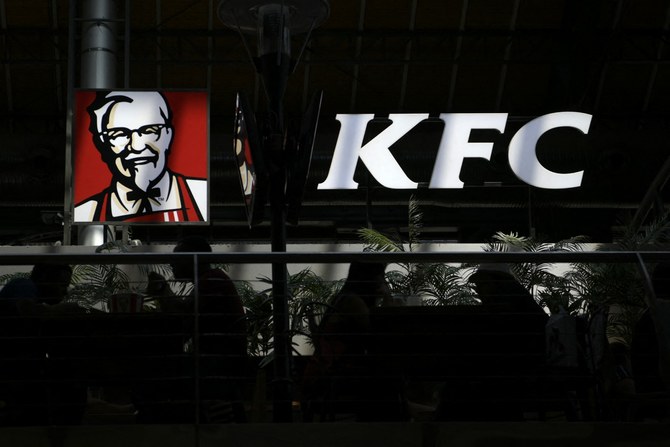
- Protesters gathered outside outlet last week in solidarity with Palestinians
- KFC parent company Yum! Brands has faced backlash for its ties with Israel
LONDON: Algeria’s first Kentucky Fried Chicken outlet has resumed operations after a temporary closure prompted by a series of pro-Palestinian demonstrations last week.
However, the restaurant, situated in the Algiers suburb of Dely Ibrahim, reopened its doors without the familiar Col. Sanders logo on its exterior.
It remains unclear if the outlet has had a change of ownership or remains under the umbrella of Yum! Brands, the parent company of KFC.
Demonstrators gathered outside the eatery on April 16, calling for a boycott and expressing solidarity with Palestinians amid the Gaza conflict.
Protesters draped in Palestinian flags voiced support for “Palestinian martyrs” while obstructing access to the storefront.
The restaurant has faced a backlash due to its perceived ties to Israel, with Yum! Brands having made investments in Israeli startups, including TicTuk, a company that allows customers to order food on social networks and message apps, and Dragontail, a system software company specializing in food processing.
In response, the Boycott, Divestment, Sanctions movement designated KFC’s sister company, Pizza Hut, as an “organic boycott target,” due to the “brands’ complicity in Israel’s genocide and apartheid against Palestinians.”
بعد أيام من افتتاح فرعها الأول، KFC الجزائر تزيل شعار علامتها وتُغلق أبوابها!
— أحمد داود (@AhmadDaoud14) April 17, 2024
منذ افتتاحها تعالت أصوات مقاطعتها، ووقفات احتجاجية أمامها، واستنكارٌ لمنح الترخيص لوكيلها! #الجزائر
pic.twitter.com/rIaOG80xTi
While the temporary closure of the KFC outlet was hailed as a success by demonstrators, its reopening sparked disappointment among some Algerians.
The incident underscores challenges and employment ramifications stemming from boycotts related to the Gaza conflict.
Since the start of the war, regional franchises of McDonald’s, one of the key boycotted brands, have distanced themselves from the parent company, arguing that they are 100 percent local.
The opening of a KFC branch in Algeria was noteworthy given the nation’s historical aversion to Western food chains, as well as its stringent foreign investment regulations, which typically prohibit the establishment of foreign food or beverage franchises.
Previous efforts to establish outlets without official approval, such as the brief appearance of a counterfeit “Starbucks,” have been met with swift action and closure.
Doner diplomacy: German president’s kebab trip to Turkiye sparks controversy
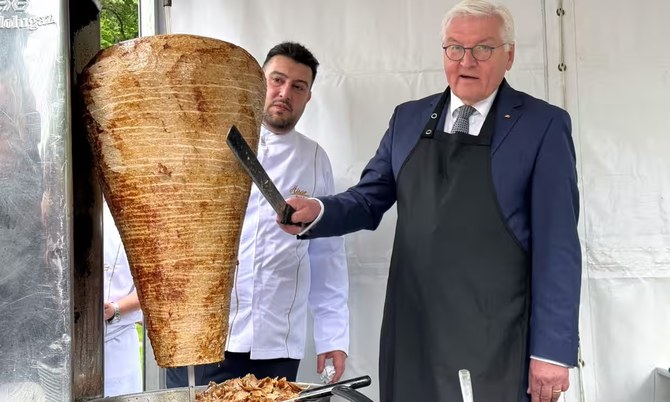
- German-Turkish say 60-kg kebab skewer brought from Germany in diplomatic mission reduces community’s contributions to stereotypical image
LONDON: German President Frank-Walter Steinmeier’s visit to Turkiye this week has stirred controversy after he brought along a 60-kg kebab skewer as part of his diplomatic mission.
Starting his three-day tour in Istanbul instead of Ankara, Steinmeier served kebabs at a reception, viewing it as a symbol of cultural exchange between the two nations.
“It is these special and intense relationships that bridge distances, and also some differences, today,” he said.
However, rather than emphasizing the close personal ties between Germans and Turks, the gesture drew criticism from many in the diaspora who viewed it as reducing their community’s contributions to a stereotypical image.
Germany, home to 2.7 million people of Turkish descent, welcomed hundreds of thousands of workers in the 1960s as part of its “guest worker” program, a bilateral agreement with Ankara to address labor shortages.
Turkish-Germans took to social media to condemn what they saw as a clumsy attempt to represent their community, accusing Steinmeier of failing to take them seriously or treat them as equals.
“Turkish-Germans discovered the 1st COVID vaccine in the world; some were movie directors who won awards on behalf of Germany, numerous writers, musicians, intellectuals from Turkey call Germany home,” wrote Evren Celik Wiltse, a professor of political science, on X.
“Of all of these, the (German) president chose the kebab maker to accompany him to (Turkiye)”, she added.
Turkish-Germans discovered the 1st COVID vaccine in the world; some were movie directors who won awards on behalf of Germany, numerous writers, musicians, intellectuals from Turkey call Germany home.
— Evren Celik Wiltse (@EvrenWiltse) April 22, 2024
Of all these, the president chose the kebab maker to accompany him to https://t.co/ZVMHyi48P0
Berkay Mandıracı, a senior analyst of Turkish-German heritage at the non-governmental organization Crisis Group, acknowledged that the gesture was well-intentioned but felt it was “anachronistic and reductionist.”
A well-intended gesture, I'm sure, but somehow not belonging to this age. As someone born and raised (until I was 12) in Germany, this feels anachronistic and reductionist.
— Berkay Mandıracı (@BerkayMANDIRACI) April 23, 2024
But let's not read too much into it and hope the rest of the visit will deepen Turkish-German ties https://t.co/ZjUvCLH7ES
The faux pas, which risked overshadowing the celebration of 100 years of diplomatic ties between the two nations, received the approval of Arif Keles, a third-generation kebab shop owner invited on the delegation trip by Steinmeier.
Keles, who served kebabs during the reception, described the opportunity as a “great honor.”
The dish of thinly sliced meat cooked on a vertical rotisserie was introduced to Germany by Turkish migrants.
Packed with chopped vegetables and doused with mayonnaise, the doner kebab has gained iconic status.
Local sales of the kebab total an estimated €7 billion ($7.5 billion), an immigrant success story the German presidency wanted to celebrate as an example of “how much Turkiye and Germany have grown together.”
Relations between Berlin and Ankara have been strained by various disputes, including disagreements over the Gaza conflict.
Steinmeier, visiting Turkiye for the first time since assuming office in 2017, has had a challenging relationship with Turkish President Recep Tayyip Erdogan, criticizing him for his approach to concerns about democratic norms in Turkiye.
Turkish-Germans have long spoken up about economic and social exclusion. Last year, Germany agreed to significantly ease citizenship rules to allow more dual nationals, a move welcomed by many Turkish individuals who have lived in Germany for decades.
With AFP
Controversy erupts as British MP Lee Anderson misses St. George’s Middle Eastern heritage

- The politician fails to acknowledge the patron saint of England’s connection to the Middle East in a video posted to celebrate St. George’s Day
LONDON: Reform UK MP Lee Anderson faced mockery after failing to acknowledge St. George’s historical ties to the Middle East in a recent social media post.
The former politician, who joined the far-right party after being suspended by the Conservatives for racist remarks about Mayor of London Sadiq Khan, shared a video on Tuesday commemorating St. George’s Day.
In it, Anderson proudly displayed red and white cufflinks matching the English flag. Also known as the St. George’s Cross, the symbol is historically associated with the Christian crusades.
“It’s St. George’s Day today and this country of ours has been a gift to the world,” Anderson said in the video.
In the accompanying caption, he wrote: “Trigger Warning. If you are a Guardian reading, advacado eating, Palestinian flag waving, Eddie Izzard supporting Vegan then this clip is probably not for your consumption.”
Anderson’s comments sparked amusement among users on X, where critics seized on his misspelling of “avocado” and highlighted the connection between Palestine and St. George, who is revered not only in England but also in parts of Africa, the Middle East, the Caucasus, and South America.
Comedian Shaparak Khorsandi quipped: “Who is going to tell him about St George’s connection to Palestine? (His mother was Palestinian, they too have a St. George’s day/feast. Though, to be fair, it is not known if he was related to Eddie Izzard),” referring to the actor/comedian.
Another user responded by sharing an image detailing facts about St. George, suggesting that if he were alive today, he would be considered an “immigrant” by Anderson’s standards, a group the Reform UK MP has repeatedly advocated should be deported.
Happy St George’s day. pic.twitter.com/Zq9cKGksOK
— GonePrivateIsh - still the same drivel (@Lairdysnr) April 23, 2024
Observed annually on the anniversary of St. George’s death with parades and marches, St. George’s Day was previously a national holiday and was once celebrated in England as widely as Christmas.
Born around AD 280 in what is now known as Cappadocia, Turkiye, St. George served as a soldier in the Roman army and fought in the crusade against Muslims. Beheaded in modern-day Palestine for refusing to renounce his Christian faith, St. George is revered by Christians, Druze and some Muslims as a martyr of monotheistic faith.
Renowned for his strength, courage and loyalty, St. George became a cherished figure in Europe and has been a symbol of English culture since the 14th century, despite never setting foot in the country.










